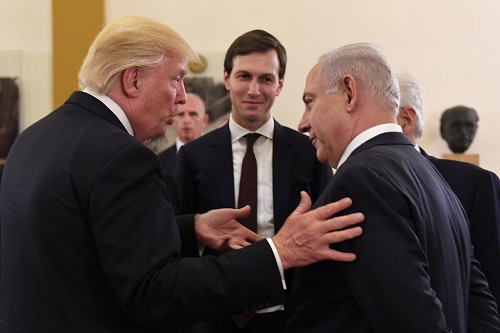IM photo
By
Tom Arms
Deep in the bowels of the White House Jared Kushner—husband of First Daughter Ivanka, son-in-law of President Donald Trump, new best friend of Saudi Crown Prince Mohammad Bin Salman and mini property tycoon—is beavering away on a “break and remake” proposed solution to the Arab-Israeli conflict. The results of his efforts are expected to soon be unveiled with Trumpian hyperbole in “the most detailed peace plan ever.”
The particulars are a closely guarded secret, but the White House sieve has leaked. And—surprise, surprise—the Israelis are delighted and the Palestinians are wretchedly disconsolate.
At the heart of what Trump officials are calling “the deal of the century” is a plan to strip five million Palestinians of their refugee status. This leaves a much more manageable half a million who could easily be accommodated in Gaza or the West Bank without the current overcrowding problems. It also provides a statistical justification for the cut in US aid to the Palestinians. Last week another $200 million was slashed on top of other reductions.
The thinking is simple: If the number of refugees has been cut by ninety percent then the remaining half a million don’t need as much money; perhaps even ninety percent less. It is a brilliant piece of accountancy logic that is truly worthy of the Trump Administration’s penchant for life and death policy decisions based on alternative facts.
At the moment Palestinian refugees come under the protective wing of the United Nations Relief and Works Agency (UNRWA). Different national governments contribute to its coffers and the UNRWA ensures that the money is spent wisely. In 2017 this meant schools for half a million children, medical facilities for 3.1 million and 437,000 small business loans. The total spent last year was just over a billion dollars of which $369 million came from Washington. Most of the rest– $432 million – came from European countries.
Then came Trump’s decision to cut foreign aid overall, quickly followed by the furore over his recognition of Jerusalem as capital of Israel and the Palestinian Authority’s decision to break off relations with Washington. A furious Trump pulled out the financial scissors and cut, cut, cut. It is not yet clear exactly how much American money will go to the UNRWA this year, but most experts reckon it will be down at least 75 percent to approximately $65 million. UN Ambassador Nikki Haley is reported to have wanted it axed altogether but was overruled by Defence Secretary James Mattis and former Secretary of State Rex Tillerson who were concerned about the impact on key regional ally Jordan.
Other countries are trying to plug the gap. The European Commission has upped its annual contribution by $53 million and Germany by $28.8 million. Other European countries plan to follow suit and Japan has pledged a one-off payment of $28.4 million in 2018 on top of its annual $48 million contribution. Trump has said that it is time for other countries to pay more but the sudden appearance of a $300 million hole is difficult to fill. The UNRWA has warned that the result will be “dire humanitarian consequences.”
But, at the risk of repeating myself, the money would stretch much further if it was required for only ten percent of the current number of refugees. Exactly where the half a million figure comes from is unclear. It could relate to the original number of Palestinians forced out in 1948 during the creation of the state of Israel. Israeli Premier Binyamin Netanyahu claims that only about 50,000 Palestinians can be properly classified as refugees. The UNRWA says the figure is 5.5 million with 1.3 million in eight UN administered camps in Gaza; 525,000 in Syria without citizenship rights; 800,000 in overcrowded West Bank camps; two million in ten UNRWA camps in Jordan; 450,000 denied public services in Lebanon and 50,000 without residency rights in Egypt.
Jared Kushner recently wrote in a leaked email : “Sometimes you have to strategically risk breaking things.” Well, breaking things is what the Trump Administration is good at.
Tom Arms
I am a journalist, entrepreneur and historian with extensive experience in print, web and broadcast journalism. I started as a diplomatic correspondent, wrote several books (The Falklands Crisis, World Elections On File and the Encyclopedia of the Cold War), and then in 1987 started my own business (Future Events News Service, www.fensinformation.com) which over 25 years established itself as the world and UK media’s diary. Our strapline was: “We set the world’s news agenda.” I sold FENS in December 2012 but retained the exclusive broadcast rights to all of FENS data. To exploit these rights I set up LookAhead TV which produces unique programmes which “Broadcasts Tomorrow Today” so that viewers can “Plan to Participate.” LookAhead has appeared regularly on Vox Africa, Radio Tatras International, The Conversation and Voice of Africa Radio.
In addition to being a syndicated broadcaster and columnist on global affairs, Tom is also available for speaking engagements and can be contacted on Twitter, Linkedin and email: [email protected].



No Comments Yet!
You can be first to comment this post!